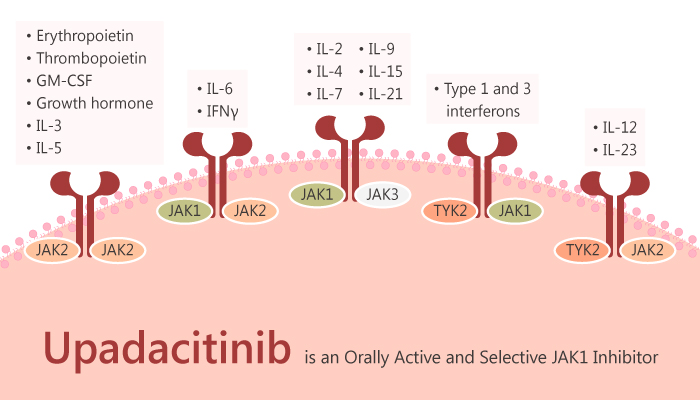Biologic agents are highly effective therapies. It greatly improves the standard of care for patients with rheumatoid arthritis (RA). Even with the significant improvement in care, the maximal benefit has limitations. The inhibition of the JAKs may modulate the inflammatory response. Thus, it is important the medicines develop to target RA. The Janus kinase (JAK) family of intracellular signaling enzymes is a known target. The JAK family has 4 members: JAK1, JAK2, JAK3, and Tyk2. They are important signaling molecules. They involve a diverse range of biological functions such as cytokine and growth factor signaling. JAK molecules act cooperatively to transduce cytokine signaling, but in certain cellular settings may preferentially use one JAK over another. In this study, Upadacitinib is an orally active and selective JAK1 inhibitor (IC50=43 nM).

Upadacitinib displays approximately 74 fold selective for JAK1 over JAK2 (IC50=200 nM) in cellular assays dependent on specific, relevant cytokines. Moreover, it potently inhibits the JAK1 dependent cytokines IL-6, OSM, IL-2, and IFNγ, as measured by inhibition of STAT phosphorylation. In the adjuvant-induced arthritis model, Upadacitinib results in dose and exposure dependent reductions in paw swelling. In addition, it improves synovial hypertrophy, inflammation, cartilage damage and bone erosion at the 3 and 10 mg/kg dose group. Furthermore, Upadacitinib spares reticulocyte deployment and NK cell count depletion relative to efficacy.
In summary, Upadacitinib is a selective JAK1 inhibitor. It also is a potent inhibitor of inflammation and bone loss in rat adjuvant-induced arthritis. Upadacitinib is used in developing for the treatment of several autoimmune disorders.
Reference:
Parmentier JM, et al. BMC Rheumatol. 2018 Aug 28;2:23.